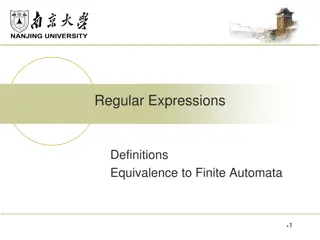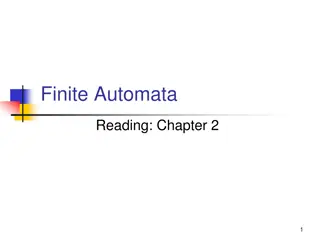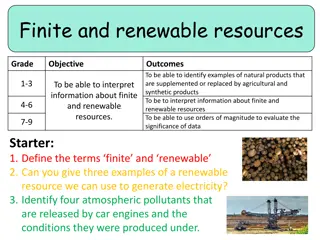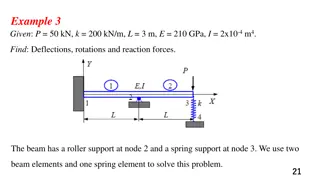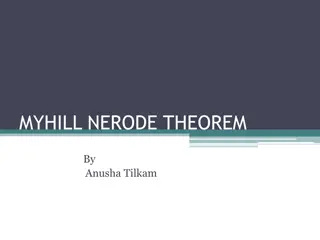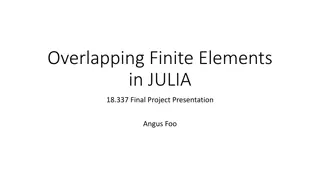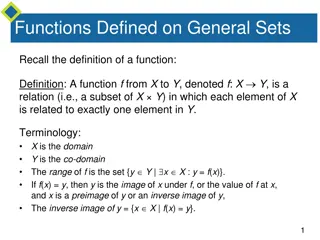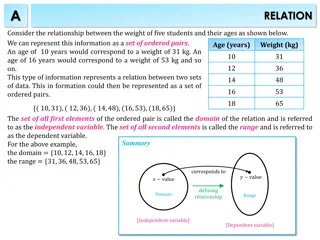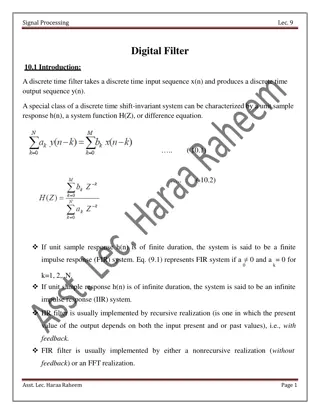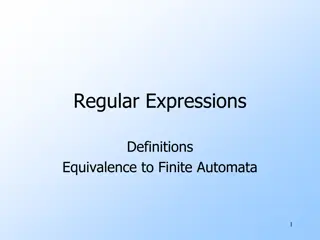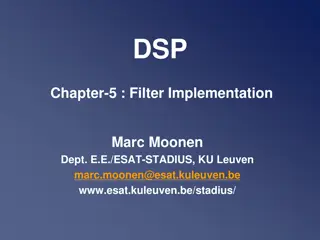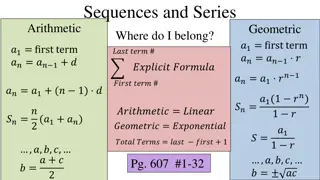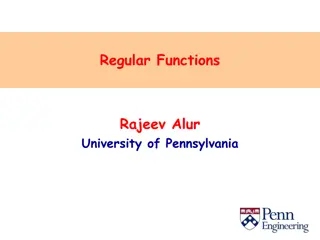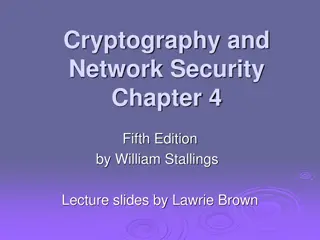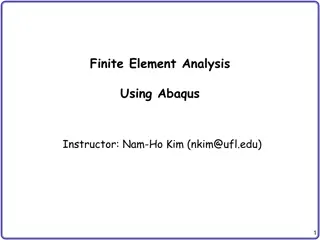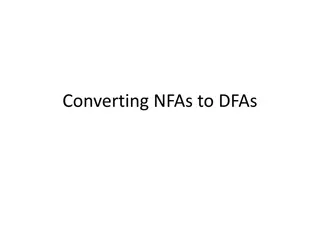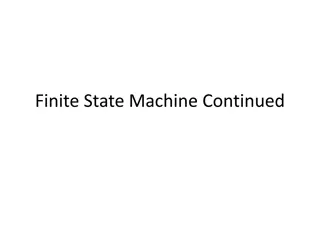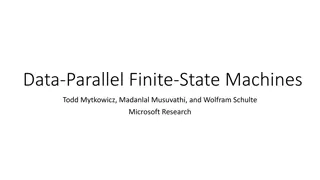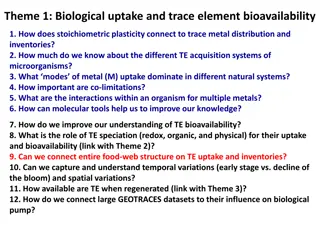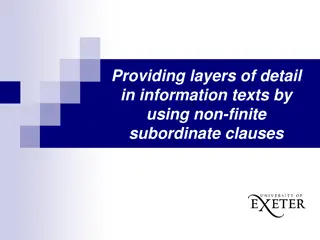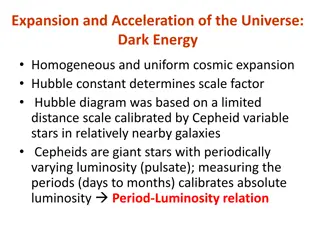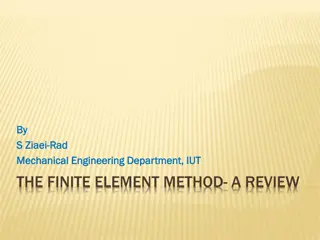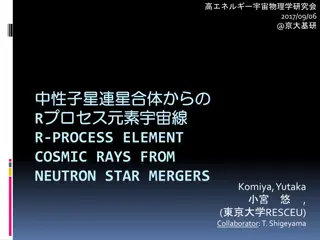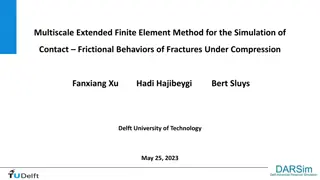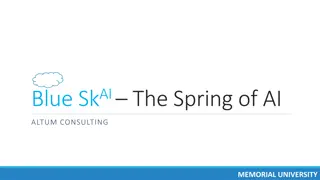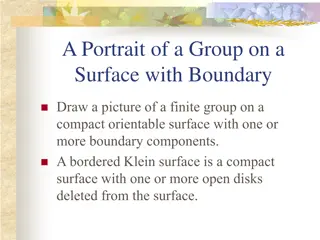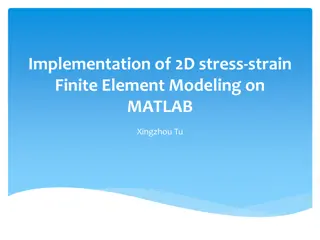Structural Design Using Finite Elements - Introduction to Safety Margins
In the field of structural design using finite elements, understanding safety margins is crucial. Factors of safety, response vs. capacity, sufficiency factors, and excess capacity are explained to ensure structural integrity and performance optimization.
1 views • 36 slides
Introduction to Regular Expressions and Equivalence to Finite Automata
Regular expressions (REs) are used to describe languages by algebra and are equivalent to finite automata. They define regular languages precisely using operations like union, concatenation, and Kleene star. The concatenation of languages combines strings from two languages, while the Kleene star re
9 views • 106 slides
Brown Act Basics for Housing Element Working Group
The Housing Element Working Group held a meeting on May 6, 2021, focusing on key topics such as Introduction to Brown Act, Housing Element 101, Working Group Processes, and Election of Co-Chairs. Housekeeping items were highlighted, emphasizing clear communication and technological flexibility. The
0 views • 37 slides
Finite Element Analysis of Heat Transfer Problems
Analogy between stress analysis and heat conduction analysis is discussed. Various thermal problems, including steady-state heat transfer and governing differential equations, are explored. Conservation of energy and boundary conditions are detailed for solving thermal analysis problems.
0 views • 35 slides
Understanding Deterministic Finite Automata (DFA) in Regular Language Theory
An exploration of Deterministic Finite Automata (DFA) in the context of Regular Languages, covering their definition, functioning, application in recognizing input strings, and building a DFA for a specific language. The Chomsky Hierarchy and the significance of Regular Languages are also briefly di
0 views • 41 slides
Understanding Finite and Renewable Resources in Environmental Science
Explore the concepts of finite and renewable resources, the implications of their usage, examples of natural products replaced by synthetic alternatives, and the importance of sustainability. Delve into the significance of identifying atmospheric pollutants, evaluating data, and fostering responsibl
9 views • 20 slides
Engineering Beam Analysis using Finite Element Method
Solve beam analysis problems involving deflections, rotations, and reaction forces using the finite element method. The examples provided cover scenarios with roller supports, spring supports, and internal hinges. Learn how to determine displacements, rotations, and element forces in beams of varyin
0 views • 42 slides
Understanding Myhill-Nerode Theorem in Automata Theory
Myhill-Nerode theorem states that three statements are equivalent regarding the properties of a regular language: 1) L is the union of some equivalence classes of a right-invariant equivalence relation of finite index, 2) Equivalence relation RL is defined in a specific way, and 3) RL has finite ind
1 views • 20 slides
Enhancing Finite Element Analysis with Overlapping Finite Elements in Julia
Finite Element Methods (FEM) play a crucial role in solving complex PDEs in various domains. Overlapping Finite Elements in Julia aim to minimize reliance on mesh quality, improving solution accuracy. By leveraging Julia's matrix capabilities and efficient implementations, users can achieve faster c
1 views • 19 slides
Understanding Functions: Definitions and Arrow Diagrams
Recall the definition of a function, where each element in the domain is related to exactly one element in the co-domain. Arrow diagrams can visually represent functions from finite sets X to Y. In this example, a function is defined from X = {a, b, c} to Y = {1, 2, 3, 4} using arrow diagrams, showc
8 views • 28 slides
Understanding Relations and Functions in Mathematics
A relation is a correspondence between two sets where each element in the first set (domain) corresponds to at least one element in the second set (range). Functions are special relations where each element in the domain has a unique correspondence in the range. Surjective functions map the entire r
0 views • 12 slides
Introduction to Digital Filter Design in Signal Processing
Discrete time filters play a crucial role in signal processing, with finite impulse response (FIR) and infinite impulse response (IIR) systems being two key types. FIR filters have finite duration unit sample responses, while IIR filters have infinite duration responses. FIR filters are implemented
1 views • 12 slides
Equivalence of Regular Expressions and Finite Automata
Regular expressions are an algebraic method to describe languages, specifically the regular languages. They are defined recursively based on symbols and operations such as concatenation and closure. Precedence rules and examples are also provided. The equivalence between regular expressions and fini
0 views • 25 slides
Understanding the Periodic Table: Atomic Structure and Element Classification
Explore the fundamental concepts of the periodic table, including how to locate atomic numbers and masses, identify element groups, understand group and period distinctions, and analyze element properties. Delve into historical perspectives from scientists like D. Bereiner and Mendeleev, and grasp t
0 views • 38 slides
Chapter 5: Filter Implementation and Finite Word-Length Problem Overview
This chapter delves into the implementation challenges of digital filters, particularly focusing on the finite word-length problem. It discusses issues such as coefficient quantization, arithmetic operations, quantization noise, statistical analysis, limit cycles, and scaling. Various realizations a
0 views • 32 slides
Exploring Sequences and Series in Mathematics
Delve into the world of sequences and series, understanding the concepts of arithmetic and geometric progressions. Learn to identify finite and infinite sequences, explore various patterns, and model them mathematically. From arithmetic to geometric, finite to infinite, this content offers a compreh
0 views • 52 slides
Understanding Integer Sequences and Terms
Explore the concepts of integer sequences, including infinite and finite sequences, terms of a sequence, and nth term formulas. Learn to classify sequences as finite or infinite and find specific terms in a sequence. Gain a comprehensive understanding of notation and terminology used for describing
3 views • 23 slides
Understanding Finite Automata and Regular Functions in Computer Science
Exploring the concepts of regular functions, languages vs functions, finite-state computation, finite automata with cost labels, finite automata with cost registers, and examples of Cost Register Automata. These topics delve into the theoretical and practical aspects of defining functions and comput
1 views • 46 slides
Understanding Finite and Non-finite Verbs in English Grammar
Explore the concept of finite and non-finite verbs through examples and explanations. Learn to identify different types of verbs, their relationship with subjects and tenses, and how they function in sentences. Enhance your understanding of English grammar with practical insights and tips provided i
0 views • 19 slides
Basic Concepts in Number Theory and Finite Fields for Cryptography
In this presentation, the basic concepts of number theory, including divisors, properties of divisibility, the division algorithm, and the greatest common divisor (GCD), are explored in the context of cryptography and network security. The importance of finite fields in cryptographic operations such
0 views • 38 slides
Finite Element Analysis Using Abaqus: Basics and Methods
Learn about the basics and methods of Finite Element Analysis using Abaqus. Explore topics such as preprocessing, interactive mode, analysis input files, components modeling, FEM modeling, and more. Understand the advantages and disadvantages of using GUI versus Python scripting, and how to create F
0 views • 33 slides
Understanding Finite State Machines in Computing
Discover the world of Finite State Machines (FSMs) in computing through images and explanations. Learn about base elements, software complexity, DFA terminology, high reliability proofs, and practical examples like the Fox Chicken Grain Problem. Dive into FSM specifications and explore Java code gen
0 views • 18 slides
Exploring Finite and Non-Finite Verbs in English Grammar
This content introduces the concept of finite and non-finite verbs in English grammar through examples and explanations. It covers the definitions, identification, and usage of finite and non-finite verbs, with practical examples provided for better understanding. The tips mentioned help in distingu
0 views • 20 slides
Numerical Solution of Eulerian Advection Equation in 1-D Operator Splitting
Application of operator splitting over three directions allows reducing the Eulerian advection equation to 1-D, enabling finite differencing of derivatives while maintaining conservation properties. Various numerical schemes like forward Euler, leapfrog, and linear upstream are discussed, highlighti
0 views • 8 slides
Compiler Data Structures and NFA to DFA Conversion
Compiler data structures play a crucial role in the compilation process, handling lexical analysis to code generation. Understanding the conversion from non-deterministic finite automata (NFA) to deterministic finite automata (DFA) is essential for efficient language processing and optimization.
0 views • 10 slides
Understanding Finite State Machines in Digital Logic Design
Finite state machines play a crucial role in digital logic systems, allowing for the implementation of sequential circuit designs. These machines consist of states and transition functions, determining system behavior based on inputs and current state. The output function generates outputs based on
0 views • 35 slides
Data-Parallel Finite-State Machines: A Breakthrough Approach
This research discusses a new method for breaking data dependencies in data-parallel finite-state machines. It highlights the importance of FSMs in various algorithms and the need for parallel versions in processing large data sets. The study explores breaking data dependences with enumeration and t
0 views • 19 slides
Understanding Biological Uptake of Trace Elements in Natural Systems
Explore the connection between stoichiometric plasticity and trace metal distribution, investigate microbial acquisition systems, analyze modes of metal uptake, and address co-limitations and interactions within organisms. Utilize molecular tools to enhance knowledge on trace element bioavailability
0 views • 5 slides
Enhancing Information Texts with Non-Finite Subordinate Clauses
Providing layers of detail in information texts involves using non-finite subordinate clauses to establish connections between grammar, meaning, and rhetorical effects. The LEAD principles emphasize linking grammar to writing purposefully, using authentic texts as models, and fostering deep metaling
0 views • 8 slides
Understanding the Expansion and Acceleration of the Universe
The expansion and acceleration of the universe, driven by dark energy, is characterized by a homogeneous and uniform cosmic expansion. The Hubble constant, determined by the scale factor, plays a key role. The Hubble diagram, based on Cepheid variable stars in nearby galaxies, uses their varying lum
0 views • 10 slides
Biologically Important Evening Element in Promoter Regions: Insights from Research by Leila Shokat
The research explores the significance of the Evening Element as a motif in gene promoter regions regulated by CCA1. Understanding the importance of motif positions in promoters reveals insights into gene regulation and biological relevance. The study highlights the relevance of consistent motif pos
0 views • 6 slides
Update on Alameda County Community Development Agency Planning Projects
Alameda County Community Development Agency Planning Department's update on general plan projects focusing on the Housing Element, Environmental Justice Element, and Safety Element. The General Plan is required by State Law, with specific elements such as Land Use, Circulation, Open Space, Conservat
0 views • 25 slides
An Overview of Finite Element Method in Mechanical Engineering
Finite Element Method (FEM) in mechanical engineering is a powerful numerical technique involving dividing a domain into finite elements, establishing relations between variables, and assembling elements to analyze a system. This method is fundamental for solving one-dimensional problems and approxi
0 views • 63 slides
Neutron Star Mergers and Ultra Heavy Element Cosmic Rays: Exploring Their Connection
Delve into the intriguing link between neutron star mergers and the synthesis of ultra heavy element cosmic rays. The rapid neutron capture process, known as r-process, plays a crucial role in creating elements heavier than iron through events like neutron star mergers and core-collapse supernovae.
0 views • 19 slides
Multiscale Extended Finite Element Method for Fracture Contact Simulation
Simulation of contact frictional behaviors of fractures under compression using the Multiscale Extended Finite Element Method (XFEM). The method involves solving governing equations, incorporating additional degrees of freedom, and employing penalty methods. MS-XFEM enhances computational efficiency
0 views • 13 slides
Navigating Challenges in the AI Industry: Element AI Analysis and Recommendations
In this presentation, the team explores the growth trajectory of Element AI amidst hurdles in the industry. They discuss key issues, objectives, and provide a recommendation for Element AI to establish a North American AI conglomerate. The analysis delves into the AI industry overview, challenges of
0 views • 40 slides
Exploring Finite Groups on Compact Surfaces with Boundaries
Illustrating the concept of finite group structures on compact surfaces with boundaries, this presentation showcases transformations, orientations, and color-coding used to represent group elements. By identifying regions in the hyperbolic plane and applying inversions, the images provide insights i
0 views • 28 slides
Understanding the Housing Element Update in West Hollywood
Explore the Housing Element Update in West Hollywood, covering topics like the planning process, regional housing needs assessment, current housing trends, and future steps. Learn about the significance of the Housing Element, its requirements under state law, and the key aspects of the 2013-2021 pl
0 views • 36 slides
Finite Element Modeling for Stress-Strain Analysis in 2D Structures
Explore the implementation of 2D stress-strain Finite Element Modeling using MATLAB. Understand the concepts of stress, strain, plane stress conditions, stress-strain relation, Turner Triangle in FEM, linear interpolation, stress and strain vectors, static equilibrium, and stiffness matrix. Learn ho
0 views • 18 slides
Thermomechanical Analysis of Pixel-Hybrid Module by Leonardo Ribeiro
The thermomechanical analysis of the pixel-hybrid module conducted by Leonardo Ribeiro explores the challenges faced due to cycling between 213 K and room temperature, emphasizing the impact of different thermal expansion coefficients on the structure. The study involves a detailed examination of th
0 views • 19 slides

